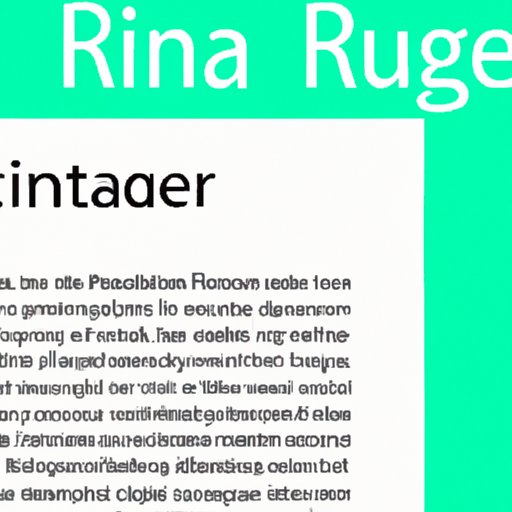Introduction
An abstract is a concise summary of a larger body of research, typically found at the beginning of a journal article, dissertation, or literature review. It is used to provide a brief overview of the study, its findings, and the conclusions drawn from them. A well-written abstract can help readers decide whether they want to read the entire document or not. As such, it is important to understand how to write an effective abstract for a literature review.
Overview of the Purpose and Main Points of an Abstract for a Literature Review
The primary purpose of an abstract for a literature review is to give readers a quick overview of the main points of the review. It should include the research question, objectives, methods, results, and conclusion. Additionally, an abstract should provide enough information to allow readers to determine if the review is relevant to their own research interests.
In general, an abstract should be between 150 and 250 words. However, some journals may have different requirements, so it is important to check each publication’s guidelines before submitting a paper.

Explanation of Different Types of Abstracts
There are three types of abstracts commonly used in literature reviews: descriptive, informative, and critical. A descriptive abstract provides a brief overview of the topic and its main points, but does not provide any analysis or evaluation. An informative abstract summarizes the main points of the review and provides some analysis of the findings. Finally, a critical abstract goes beyond simply summarizing the review; it also evaluates the quality of the research and draws conclusions based on the findings.

Summarizing Research Findings in an Abstract
When summarizing research findings in an abstract, it is important to be clear and concise. The abstract should include the most important points of the review and should not contain any unnecessary details. Additionally, writers should strive to use active voice and avoid jargon or technical language.
To demonstrate how to summarize research findings, consider this example: “This study examined the relationship between job satisfaction and job performance. Results showed that there was a significant positive correlation between the two variables. The results suggest that job satisfaction plays an important role in job performance.”
Examples of Well-Written Abstracts
Here are two examples of well-written abstracts for literature reviews:
Example 1: “This review examined the literature on the relationship between job satisfaction and job performance. A total of 28 studies were included in the review. The findings revealed that there is a significant positive correlation between job satisfaction and job performance. The results suggest that organizations should focus on improving job satisfaction in order to improve job performance.”
Example 2: “This review examined the literature on the impact of technology on student learning outcomes. A total of 36 studies were included in the review. The findings revealed that there is a positive correlation between the use of technology and student learning outcomes. The results suggest that incorporating technology into the classroom could be beneficial for students.”
Common Mistakes to Avoid When Writing an Abstract
When writing an abstract for a literature review, it is important to avoid making common mistakes. Here are some tips for writing a clear and concise abstract:
- Be sure to include the main points of the review, such as the research question, objectives, methods, results, and conclusion.
- Use active voice and avoid jargon or technical language.
- Be sure to include all relevant information, but also keep the abstract concise.
- Proofread the abstract carefully to ensure that it is free of errors.
Strategies for Selecting Relevant Information for an Abstract
When selecting information for an abstract, it is important to choose only the most important points. To do this, writers should ask themselves these questions:
- What is the most important point of the review?
- What are the key findings?
- What are the implications of the results?
- What are the limitations of the study?
By asking these questions, writers can better determine which information is most relevant and should be included in the abstract.
Conclusion
Writing an effective abstract for a literature review can be challenging, but with practice and careful consideration, it is possible to create a concise and informative summary. To do this, writers should include the main points of the review, use active voice and avoid jargon, select only the most relevant information, and proofread the abstract carefully for errors. By following these tips, writers can create a well-written abstract that will help readers decide if the review is relevant to their own research.
Summary of Important Points
Writing an abstract for a literature review can be tricky. To write an effective abstract, writers should include the main points of the review, use active voice and avoid jargon, select only the most relevant information, and proofread the abstract carefully for errors. Additionally, it is important to understand the different types of abstracts and to be aware of common mistakes to avoid when writing an abstract.

Final Reminders About Writing an Abstract for a Literature Review
When writing an abstract for a literature review, it is important to remember the following:
- Include the main points of the review.
- Use active voice and avoid jargon.
- Select only the most relevant information.
- Proofread the abstract carefully for errors.
- Understand the different types of abstracts.
- Be aware of common mistakes to avoid when writing an abstract.
By following these tips, writers can create an effective abstract for a literature review that will help readers decide if the review is relevant to their own research.
(Note: Is this article not meeting your expectations? Do you have knowledge or insights to share? Unlock new opportunities and expand your reach by joining our authors team. Click Registration to join us and share your expertise with our readers.)
